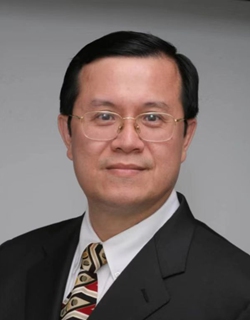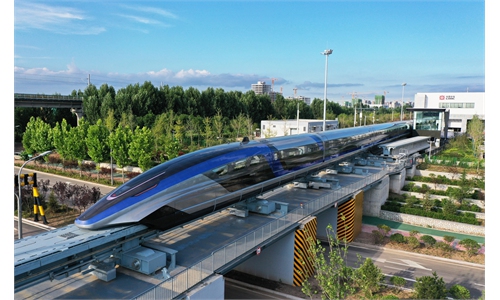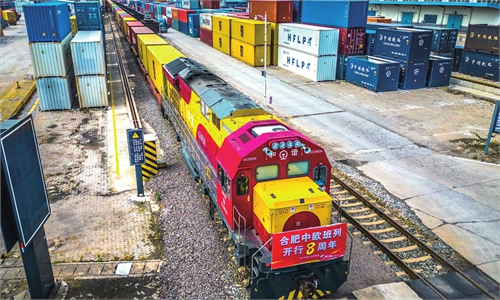CPC innovates its own formula of governance based on people's aspirations: former minister of transport of Malaysia

Illustration: Liu Rui/Global Times
Editor's Note:During the past decade, the world has increasingly witnessed a trend of "the East is rising, and the West is declining" in the spheres of economy, security and discourse power. Western countries, particularly the US, plagued by internal woes, have sought the old path of passing the buck and instigating turmoil elsewhere to ease their own pressure. China, representative of the emerging countries, is proposing new solutions to global problems. By advocating win-win development, facilitating consultation and reconciliation and proposing a balanced and effective security mechanism, China is striving to build a community with a shared future for mankind.
Ong Tee Keat (Ong), Chairman at the Centre for New Inclusive Asia, told Global Times (GT) reporter Lu Yuanzhi that "China's leaps and bounds in the past four decades are wedded to its people-centric governance" and the Communist Party of China has "the gumption to innovate its own formula of governance premised on the people's aspirations and the nation's priorities at different times."
GT: What are the advantages of China's governance model over the Western democracy? What experience of the Communist Party of China (CPC) governance can other countries learn from?
Ong: The Chinese governance is characterized by an officialdom rooted in a hybrid mode of selection and election. Officials' merits commensurate with the portfolio requirements are of prime priority. This contrasts starkly against the prevalence of political populists, many of whom are novices of ineptitude, in countries practicing Western democracy.
In the Chinese perspective, essence of democracy lies in the people's involvement in the policy formulation at various tiers of government, and not the multi-party election per se. In the Chinese political DNA, accommodative consultation precedes the Western norm of "majority rule" - where majority takes all.
Its mode of governance is more result-oriented. Over the years, the high approval ratings of the Chinese governance are the best answer in debunking the label of "authoritarianism" imposed on its polity by the West.
There are, of course, certain practices and experience of Chinese governance that others can seek to emulate adaptability. Nonetheless, wholesale transplant of Chinese governance is still a far-fetched option as all nations may have diverse cultural norms rooted in their respective civilizations and peculiarity of social fabric.
GT: You have long been engaged in China studies and have visited China for several times. What is your opinion on China's changes over the last decade? What is the main contributor? What role does CPC leadership play in it?
Ong: China's leaps and bounds in the past four decades are wedded to its people-centric governance. The ruling party, CPC, has been staying true to its founding role as the custodian of the people's wellbeing. It has the gumption to innovate its own formula of governance premised on the people's aspirations and the nation's priorities at different times. CPC's bold decision to usher in the era of "reform and opening up" is a case in point. Its pragmatic corrective nature keeps the party abreast with the changing times and challenges. Due credits have to be given to CPC for lifting 850 million out of poverty in a span of 40 years, in addition to redeeming the nation's dignity and sovereignty after a century-old humiliation, which was characterized by the presence of foreign concessions on Chinese soil.
GT: In terms of the Indo-Pacific Economic Framework (IPEF), Former Malaysian prime minister Mahathir Mohamad criticized this US-led economic grouping on May 27, saying it is intended to isolate China, and won't benefit regional economic growth without Beijing. What's your take on the launch of the IPEF?
Ong: In the first place, the IPEF is not even a trade agreement borne out of multilateral negotiation. It made no mention on tariff reduction and market access to the United States which the inaugural members have been yearning for.
The four pillars outlined in the IPEF - supply chain resiliency, clean energy and decarbonization, tax and anti-corruption, and trade - merely laid out the areas of priorities which the US Administration wants the inaugural members to comply with, albeit without much details. The writing is on the wall that IPEF is virtually nothing but a tool to self-empower Washington to dictate the rules of geo-economics in the region.
Its exclusion of China, the biggest economy in the region, is the proverbial elephant in the room. Cynical enough, it made a clear travesty of the inclusivity that IPEF claims to uphold.

Ong Tee Keat. Photo: Courtesy of Ong
GT: You said that "of the 13 inaugural members of the Economic Framework, only the United States and India are not affiliated with RCEP," and the IPEF's "high overlapping membership with RCEP is no coincidence." Will the IPEF affect RCEP's role in promoting regional economic integration?Ong: In general sense, the high degree of membership overlapping between the two groupings in the same region could either be motivated by the necessity of seeking complementarity, or simply driven by the intention of outdoing one another.
In the perspective of regional economic integration, RCEP needs no duplicity by any alternative entity, IPEF included, which is less inclusive. In the case of IPEF which is touted as "of high standard and inclusive," the exclusion of Cambodia, Myanmar and Laos - the three least developed ASEAN member states, alongside China from its inaugural membership is very self-revealing itself.
Would this contribute to the enhancement of intra-ASEAN economic integration? Or is it because the three ASEAN member states are politically pro-China, thus infringing the political correctness of values espoused by the US and resulting in the ultimate exclusion? The US Administration still owes the world clear-cut criteria for the accession to the IPEF before it can convince the international community that the new framework is indeed a boon to the regional integration and global governance.
GT: The US-ASEAN Special Summit took place in mid-May, in which Washington spared no effort to promote its Indo-Pacific Strategy to ASEAN. How do you see the US' Indo-Pacific Strategy? Can ASEAN maintain unity and consensus in the face of US' wooing?
Ong: The US' Indo-Pacific Strategy is an unambiguous statecraft document designed to contain and compete against China in defense of the US' faltering primacy in Asia-Pacific.
Under the Biden Administration, the US has renewed its efforts in wooing ASEAN, fully acknowledging the latter's centrality in the region's geopolitics. The necessity to woo ASEAN is getting more pressing after the elevation of China-ASEAN relations to that of a Comprehensive Strategic Partnership. The US anxiety of displacement is getting real and increasingly obsessional in its global geopolitical agenda.
In the face of such a diplomatic onslaught, ASEAN's unity and consensus building is set to face an unprecedented acid test. Being sandwiched in the China-US geopolitical rivalry, respective ASEAN member states may have to pick sides between the two global powers on one hand; and make a tough choice between their own national interests and toeing the collective decision on the other hand.
GT: When the US hosted the so-called Summit for Democracy last year, you expressed your insight that "the Western democracy is neither perfect nor a panacea to all problems of governance." Today, democracy has become a weapon to satisfy or expand a country's geopolitical interests. How do you evaluate the US' practices in seeking to impose on others its own brand of democracy based on its civilizational values and norms?
Ong: The practice of Western liberal democracy, wedded to the principle of "one-man one-vote", is not the entirety of democracy. In a sense, it is merely a manifestation of the electorate's aspiration but certainly not calibrated to measure the quality of governance vis-à-vis the people's needs. After all, the true sense of democracy does not begin and end with elections.
The present mode of coercive imposition of liberal democratic values by the West, irrespective of the recipient countries' social norms and values, has time and again proven a failure. A case in point is Afghanistan. Given the benefit of hindsight, such coercion in the name of promoting democracy is being weaponized to open an easy passage for the imposer to initiate "regime-change" in the targeted countries.
From the perspective of the US, it's the expansion of its geopolitical empire that matters, while the real aspirations of the recipient nations are taking a back seat. Puppet governments have been installed one after another under its watch through the so-called democratic elections, albeit not without ballot-rigging or Gerrymandering.


